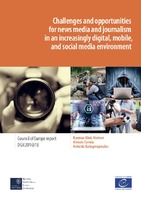| dc.contributor.author | Nielsen, Rasmus Kleis |
| dc.contributor.author | Alessio, Cornia |
| dc.contributor.author | Kalogeropoulos, Antonis |
| dc.date.accessioned | 2017-06-08T08:11:30Z |
| dc.date.available | 2017-06-08T08:11:30Z |
| dc.date.issued | 2016-10 |
| dc.identifier.uri | https://ketlib.lib.unipi.gr/xmlui/handle/ket/1139 |
| dc.description.abstract | A well-functioning democracy requires free and diverse news media capable of keeping people informed, holding powerful actors to account and enabling public discussion of public affairs. Existing research suggests that quality journalism can increase levels of political knowledge, participation and engagement, and can furthermore help reduce corruption and encourage elected officials to represent their constituents more effectively.
The freedom, diversity and ability of news media to enable democracy depend on the institutional structure of individual countries media environment. Today, these media environments are changing in part as a result of technological and market developments largely associated with the rise of digital media. This report reviews evidence-based research on the opportunities and challenges these developments represent for news media and their role in democracy in different contexts. |
| dc.format.extent | 41p. |
| dc.language.iso | en |
| dc.language.iso | fr |
| dc.publisher | Reuters Institute for the study of journalism for the Council of Europe steering committee on media and information society |
| dc.subject | Technological and market development |
| dc.subject | Media responses |
| dc.title | Challenges and opportunities for news media and journalism in an increasingly digital, mobile, and social media environment (2016) |
| dc.type | report |

